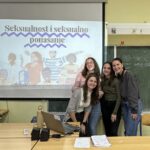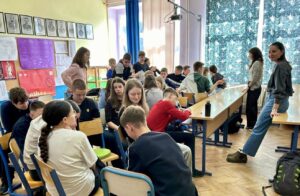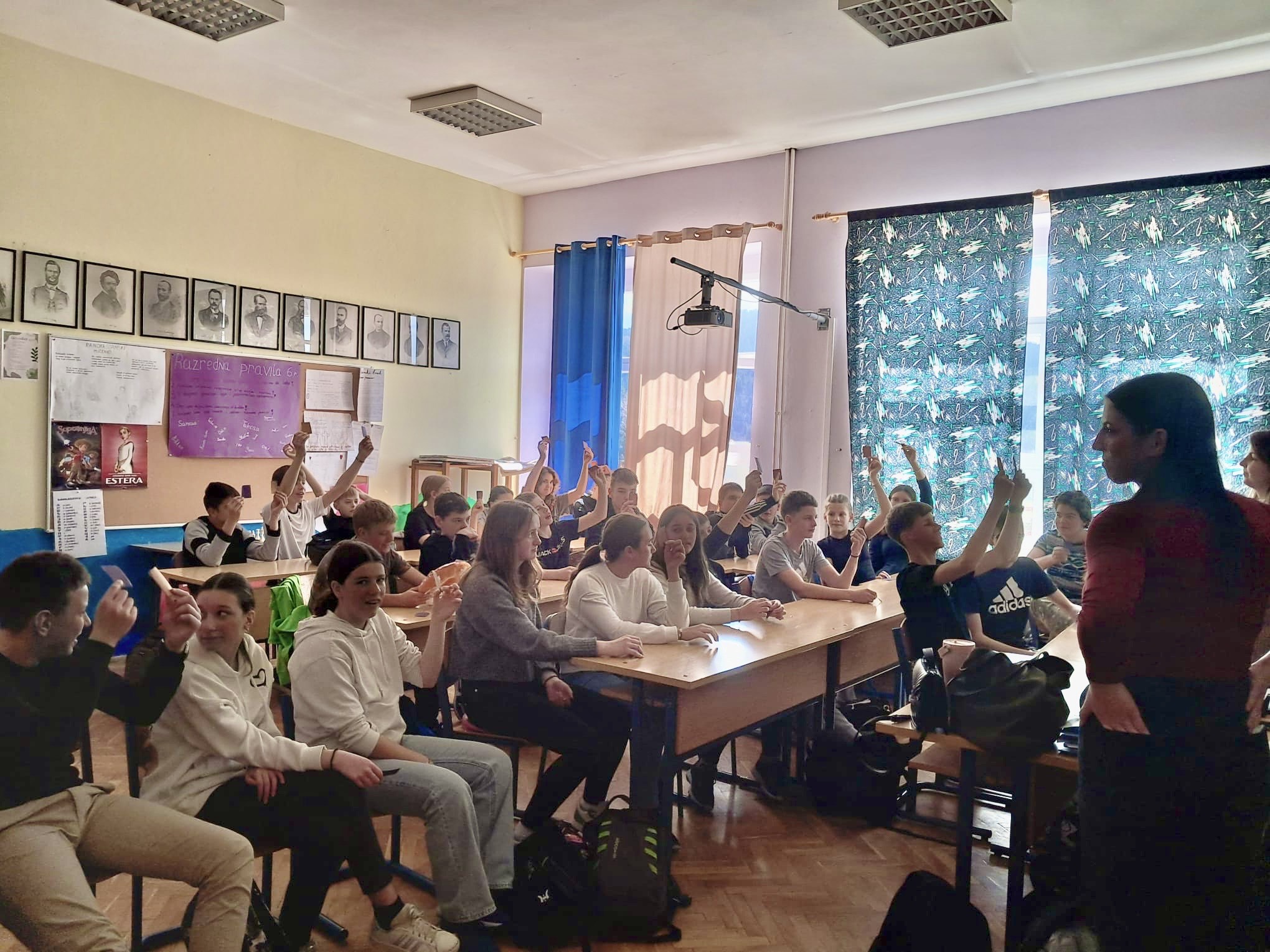During birth preparation workshops, a group of midwifery students in Croatia noticed a troubling pattern: many women lacked basic knowledge about their own bodies. For some, it was the first time they had encountered this information.
Curious about the root cause, the students began to investigate further. Their research revealed that the problem started much earlier—in schools, where comprehensive sexuality education (CSE) was either poorly taught or entirely absent.
This International Youth Day, we’re highlighting their inspiring response—an initiative that shows what it means for young people to lead change in their communities.
Motivated to make a difference, the students secured a university grant and launched a project to bring CSE directly into the classrooms. Ensuring that young people receive the information they need to make informed choices about their bodies and their sexual and reproductive health.
We sat down with two of the students behind the project, Klaudia Kamenar and Melani Žakić. Both were drawn to midwifery by a deep passion for women’s health and rights. Melani was interested in sociology and discovered that a lot of the issues she cared about were also central to midwifery. For Klaudia the motivation was clear, she realised that women are underrepresented in healthcare decision-making, and becoming a midwife was her way to speak up for those who are too often unheard.
They are both about to finish their studies and preparing to enter the profession, but they have a striking passion for education and empowering future generations with the knowledge and skills to understand their rights, protect their health, and live confidently.
The need for comprehensive sexuality education
Klaudia and Melani point out that CSE is especially important in Croatia, where it remains almost non-existent in school curricula. In the few cases where CSE is offered, it mostly focuses on risks, diseases, and sexually transmitted infections (STIs) – failing to equip young people with the tools to understand their own bodies, and rights. They also noticed how the internet has transformed the way young people access information. With so much content available online, it has become harder for youths to differentiate between reliable and misleading sources.
In response, they set out to create a safe space to learn about CSE, built on empathy, trust, and understanding. Together with three other midwifery students and two pedagogy students, Melani and Klaudia have developed evidence-based, interactive, and age-appropriate workshops that use role-playing and open discussions to ensure a friendly and inclusive environment.
“The key is openness and a non-judgmental approach, so students feel safe to ask questions and learn without shame.” – Klaudia
A powerful collaboration
 An important aspect of this project is the collaboration between midwives and pedagogues. For Melani and Klaudia, one of the biggest initial challenges was figuring out how to approach complex and sensitive topics with children and younger audiences. They admitted feeling uncertain about how best to teach teenagers about sexuality and reproductive health. That is why joining forces with pedagogy students made such a big difference; together they could design strategies to overcome the typical classroom stigma, as well as adapt vocabulary for different age groups, and deliver content in a way that was both engaging and inclusive.
An important aspect of this project is the collaboration between midwives and pedagogues. For Melani and Klaudia, one of the biggest initial challenges was figuring out how to approach complex and sensitive topics with children and younger audiences. They admitted feeling uncertain about how best to teach teenagers about sexuality and reproductive health. That is why joining forces with pedagogy students made such a big difference; together they could design strategies to overcome the typical classroom stigma, as well as adapt vocabulary for different age groups, and deliver content in a way that was both engaging and inclusive.
A ripple-effect to the community
So far, the team has implemented eight workshops across two schools, in both urban and rural areas, and the response has been incredibly positive.
“I remember the first presentation when the students were so excited to be there, rushing to the front row. They were eager to learn, and every time we came back, they were even more excited to see us.” Melani shares.
The most significant impact for her was to see the young students open up about different topics and how comfortable they felt asking questions.
In rural Croatia, open dialogue about sex and reproductive health is still rare, but Klaudia saw a shift starting to happen and hopes that this openness will have a ripple effect on their friends and families. She was especially proud of the support the project received, not only in the classrooms, but from the community and teachers as well.
“Imagine that after the sessions the adults even asked us to come back – but to have the workshops just for them!” says Klaudia.
The importance of youths teaching youths
Peer-to-peer education has proven to be an effective approach to learning that allows young people to build confidence, promote empathy and encourage critical thinking, all while empowering the next generation.
 Klaudia and Melani experienced this first hand. Because of the small age gap between them and the students, they were able to communicate in a relatable way, using familiar language and creating an open, trusting environment. Students felt more comfortable asking questions, something that might not happen so easily with older, more distant professionals.
Klaudia and Melani experienced this first hand. Because of the small age gap between them and the students, they were able to communicate in a relatable way, using familiar language and creating an open, trusting environment. Students felt more comfortable asking questions, something that might not happen so easily with older, more distant professionals.
From a teaching perspective, the closeness in age also gave Klaudia and Melani a unique insight into how students think and what language and examples would resonate the most. This helped them tailor their workshops in a way that made information clearer, more accessible, and easier to connect with.
The invaluable role of midwives
Lastly, we asked Klaudia and Melani what advice they would give to other young or future midwives interested in working with youths and delivering comprehensive sexuality education.
“The most important thing is to not feel inadequate” says Melani. Student midwives already have such strong knowledge and bring the motivation needed to make a real difference in their communities. Therefore, she encourages others to seek support from mentors within their network and connect with organisations doing similar work to join efforts.
Klaudia also adds that the best way to learn is by doing, and teaching comprehensive sexuality education to young people is such a rewarding experience that you just need to
“go for it”.
